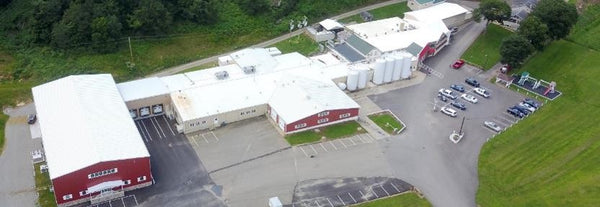For over 95 years Pearl Valley Cheese has been growing into the company it is today with a commitment to manufacturing high quality cheese, building lasting relationships, and serving our customers. We invite you to take a quick look back at some of our milestones over the years.
- 1928 - Ernest Stalder, a Swiss immigrant to Ohio, purchased the Pearl Cheese Company. It consisted of a small building where a single 200 lb. wheel of cheese was made daily in a copper kettle. He also purchased and the neighboring house for total of $700. This was the humble beginning of Pearl Valley Cheese.
- 1929 - Ernest married Gertrude Bandi, also a Swiss immigrant, and she was highly involved in all business decisions from that point forward.
- 1932 - The first truck delivered milk to the factory. Until then, the milk was brought in by horse and wagon.
- 1938 - The Stalders built a new factory just across the road from the previous location that now included electricity and multiple copper kettles and presses.
- 1940s - Pearl Valley began making brick cheese because most of the able bodied men were away at war and the 200 lb. wheels of Swiss cheese were difficult for the women to maneuver. This production eventually subsided as the Colby business grew.
- 1947 - The Ohio Farmer magazine wrote that Pearl Valley Cheese was the largest cheese plant in the state of Ohio. A title we have not been able to maintain, however still an interesting fact.
- 1950s - The Colby cheese operation was added to our facility and is still a vital part of our diversified business today. Colby cheese varieties make up about half of our production and give us a key distinction from other Ohio cheesemakers who focused solely on Swiss. Also in the 1950s, as market conditions changed, Swiss cheese began to be manufactured in blocks instead of wheels. It was more efficient to make larger batches of cheese at a time in blocks. The blocks also cut well into “sandwich cuts” that could be sold in grocery stores in the deli case.
- 1969 - The final copper kettles were replaced with 2,000 gallon stainless steel, steam-lined vats. One of the original copper kettles can still be seen outside the retail store today.
- 1970s - Additional construction at the factory included a space for the growing Colby business as well as additional warm room space for the Swiss.
- 1982 - Pearl Valley discontinued purchasing milk in cans. Buying milk in bulk was less labor intensive and typically better quality.
- 2001 - Pearl Valley undertook another expansion product after the purchase of the neighboring farm. A 20,000 square foot production facility was built and Double-O enclosed vats were installed that allowed for increased production of Swiss and Colby varieties. Since the expansion we have greatly increased our capacity to custom manufacture and private label cheese for our customers as well as promote and sell our own brand.
- 2009 - Pearl Valley built a state of the art waste water treatment plant with a biodigestor that generates biogas. The gas is then used to generate a portion of the electricity for the facility. More information can be found on here.
- 2017 - A new cooler and packaging room was added to increase production capacity
- 2020 - Whey processing operation was upgraded to be able to reclaim water from our whey be used in the cheese factory saving about 30,000 gallons of water per day and increase cheese making capacity.
- 2020 - Whey processing operation was upgraded to reclaim water from our whey, saving about 30,000 gallons of water per day and increasing cheese making capacity.
- 2022- Pearl Valley Cheese crossed the threshold and started making 10,000,000 pounds of cheese in annual production
- 2023- Pearl Valley Cheese installed new equipment for upgrading the packaging and cutting of 12 oz pieces of cheese- used in our fundraiser program, retail store and at farm markets on the east coast.
- 2024- We endeavored on a solar panel installation project, furthering our commitment to sustainable practices.

